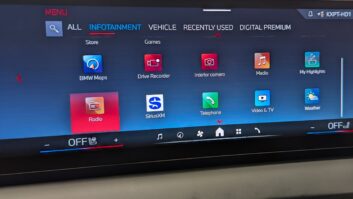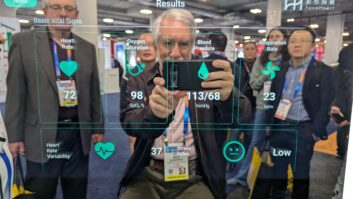Maryfrances Evans is the executive director of the Iowa Radio Reading Information Service for the Blind (IRIS) in Des Moines, Iowa, and second vice president of the International Association of Audio Information Services.IAAIS commentaries are featured regularly at radioworld.com.
On a hot August day in 1920, a crowd gathered outside the local newspaper office in Charles City, Iowa. Radio had not yet taken hold and the newspaper office was often a town’s gathering spot. A 13-year-old girl named Helen joined them as they waited for the day’s Charles City Intelligencer to come off the press. When the papers came out, the crowd burst into applause and she craned her neck to see the headline: “Women Get the Vote.”

Helen Blunt with my daughters Audrey and Frances.
Helen Blunt said that moment changed the trajectory of her life. Though she would not be old enough to vote for five more years, she knew a world of opportunities had just cracked open for a girl like her. She could vote! Her future was no longer limited to being a farm wife or a teacher. In that moment, she promised herself she would pursue as much knowledge as she could get her hands on. She promised herself to live up to the responsibility the 19th Amendment brought with it.
Helen fulfilled those promises — and then some. She graduated from Buena Vista University and became a reporter for the very newspaper she grew up with. Though her beat was limited to the society pages and obituaries, Helen reveled in writing pieces that celebrated the power and humanity in each of her subjects.
Helen and I first crossed paths in 2014. I run the Iowa Radio Reading Information Service for the Blind (IRIS). Our volunteers read newspapers aloud over a closed-circuit radio network provided by Iowa Public Radio. A search of our listener database brought up Helen’s name. I doubted we really had a listener who was 107, so I called. She was very much alive. The next weekend, I drove 120 miles for the first of many visits, often with my young daughters in tow, with one of the most interesting humans I’ve ever met.
Twenty years ago, Helen’s vision began to fail and she was given an IRIS radio. Every morning since, she put on her headphones and listened as we read The Des Moines Register, Mason City Globe Gazette and other newspapers. She sat next to that radio all day every day “reading” all the newspapers that IRIS provides. I told friends at The Des Moines Register about Helen and they responded by presenting her with their Lifetime Reader Appreciation Award — in person — in her living room.
Reading services like ours across the country can’t serve our listeners like Helen without lots of help from our friends. We are the one industry where newspapers, radio and TV collaborate to provide our listeners with equal access to the simplest of information like grocery ads, opinions and local obituaries. Iowa Public Radio’s CEO, Myrna Johnson, says, “What you do helps us meet our mission to provide news and information.”
During our last visit to Helen, by then 109, she said, “Each morning, I wake up amazed to have another day. I must still have something to learn.” She followed politics voraciously and was thrilled that she might be able to cast her ballot for a woman this November.
Helen finally completed her journey earlier this month, but she stayed true to her dedication to learning by donating her body for research. I am honored that we were able to be of service to Helen for so many years. I am so grateful to our print and broadcast partners who make it possible for reading services like ours to serve more than two million print-disabled listeners across the country. Helen is just one example of how a little collaboration can result in a very big impact.







